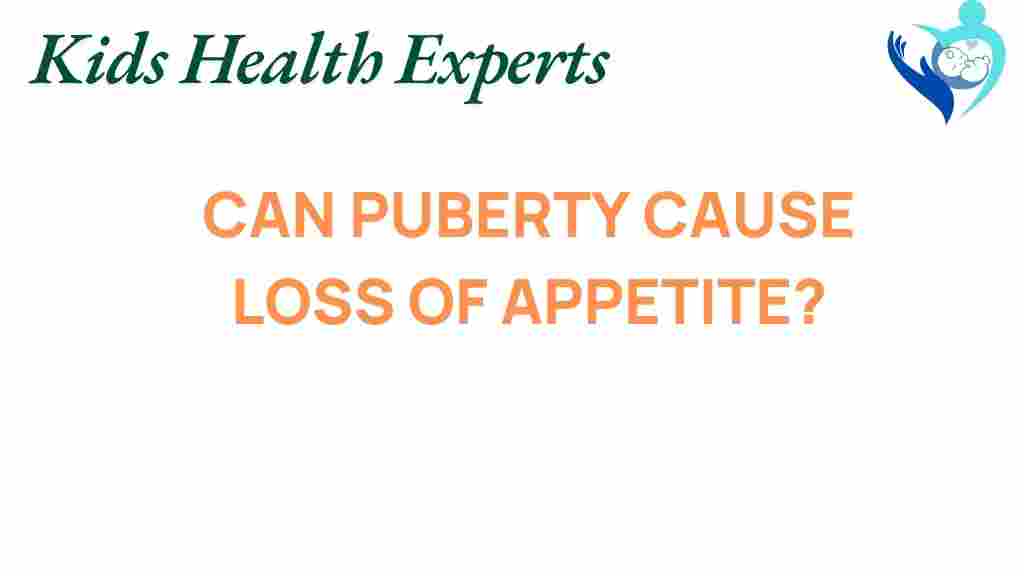Can Puberty Trigger Unexpected Appetite Changes?
Puberty is a critical period in adolescent development that brings about a myriad of physical and emotional changes. One of the less discussed aspects of this transformative phase is how puberty can trigger unexpected appetite changes. For many adolescents, this period is marked not only by growth spurts and hormonal changes but also by shifts in eating habits that can lead to appetite loss or increased hunger.
Understanding these changes is crucial for parents, guardians, and the adolescents themselves to navigate this complex phase of life effectively. This article will delve into the reasons behind appetite fluctuations during puberty, the role of nutrition, and how emotional factors and body image perceptions can influence eating behaviors.
The Role of Growth Spurts in Appetite Changes
During puberty, adolescents experience significant growth spurts. These spurts can lead to an increased caloric need, which may manifest as heightened appetite. However, some teenagers may experience the opposite effect — appetite loss. The connection between growth spurts and appetite changes is multifaceted:
- Increased Metabolism: As the body grows, metabolism speeds up, often leading to increased hunger.
- Physical Changes: The rapid changes in body composition can create discomfort, potentially leading to reduced appetite.
- Activity Levels: Teenagers may become more active during growth spurts, which can influence their hunger cues.
Hormonal Changes and Their Impact on Appetite
Hormonal changes are at the heart of puberty. The body undergoes a surge in hormones such as testosterone and estrogen, which can significantly impact appetite. These hormonal shifts can lead to:
- Increased Appetite: Hormones can stimulate hunger, prompting teens to eat more.
- Appetite Suppression: Alternatively, certain hormonal fluctuations may lead to feelings of nausea or fullness, resulting in appetite loss.
Understanding these hormonal dynamics can help adolescents and parents recognize that appetite changes are a normal part of growth and development.
Nutrition: Fueling the Growing Body
Proper nutrition during puberty is vital for supporting growth spurts and overall health. A well-balanced diet not only helps manage appetite but also ensures that the body gets the necessary nutrients to support development. Key nutritional components include:
- Proteins: Essential for muscle growth and repair.
- Carbohydrates: Provide energy for physical activities and growth.
- Fats: Necessary for hormone production and brain health.
- Vitamins and Minerals: Important for overall health, supporting bone growth, and immune function.
Incorporating a variety of foods can help maintain a healthy appetite and prevent appetite loss.
Emotional Factors and Body Image Concerns
During puberty, many adolescents become more aware of their body image and may experience emotional fluctuations that can impact their appetite. Factors influencing appetite include:
- Self-esteem: Low self-esteem can lead to disordered eating patterns, including appetite loss.
- Peer Pressure: Social influences may cause teens to alter their eating habits, either by restricting food intake or overeating.
- Stress and Anxiety: Emotional distress can significantly impact appetite, leading to either appetite loss or increased cravings for comfort foods.
Recognizing the emotional aspects of eating can facilitate healthier relationships with food during this challenging time.
To help adolescents and their caregivers manage appetite changes during puberty, consider the following steps:
- Monitor Changes: Keep track of any significant changes in appetite, weight, or eating habits.
- Promote a Balanced Diet: Encourage the consumption of a variety of nutrient-dense foods to support growth and health.
- Encourage Open Conversations: Discuss body image and emotional well-being openly to address any concerns related to self-esteem and social pressure.
- Stay Active: Encourage regular physical activity, which can stimulate appetite and promote overall health.
- Consult a Professional: If significant appetite loss or other eating issues persist, consider seeking guidance from a healthcare provider or nutritionist.
Troubleshooting Tips for Appetite Loss
If you or someone you know is experiencing appetite loss during puberty, here are some troubleshooting tips to consider:
- Small, Frequent Meals: Encourage eating smaller meals throughout the day instead of three large meals.
- Incorporate Favorite Foods: Include favorite foods in meals to make eating more appealing.
- Avoid Pressure: Avoid pressuring the adolescent to eat, as this may lead to further appetite suppression.
- Hydration: Ensure adequate hydration, but avoid excessive fluids before meals to prevent a feeling of fullness.
- Limit Junk Food: While it’s okay to indulge occasionally, excessive consumption of processed foods can lead to poor appetite regulation.
Conclusion: Embracing Changes During Puberty
Puberty is a time of profound change, and appetite fluctuations are a common part of this journey. Whether it’s increased hunger due to growth spurts or appetite loss influenced by emotional factors, understanding the underlying causes can help adolescents navigate these challenges more effectively. By focusing on nutrition, fostering open discussions about body image, and addressing emotional health, teens can develop healthier eating habits during this crucial phase of their lives.
For more information on adolescent health and nutrition, consider visiting this resource. Additionally, if you have specific concerns about appetite changes during puberty, consulting a healthcare professional is always a wise choice.
This article is in the category Nutrition and created by KidsHealthExperts Team
